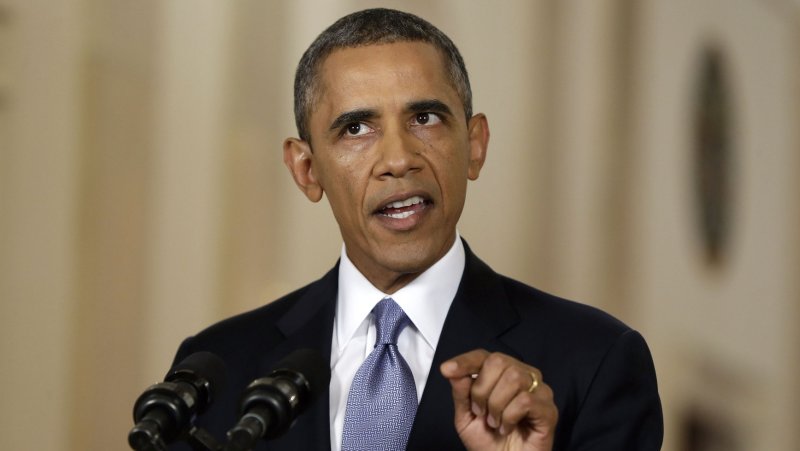1 of 2 | President Barack Obama addresses the nation in a live televised speech from the East Room of the White House in Washington on September 10, 2013. UPI/Evan Vucci/Pool |
License Photo
WASHINGTON, Sept. 10 (UPI) -- President Obama said he would rather see if a diplomatic path to rid Syria of chemical weapons is viable, saying he preferred diplomacy to a military strike.
However, he warned Tuesday, if a peaceful solution fails, the United States must respond to evidence President Bashar Assad's troops gassed several Damascus suburbs Aug. 21, killing hundreds of people.
"I have ... asked the leaders of Congress to postpone a vote to authorize the use of force while we pursue this diplomatic path," Obama said in his prime-time speech. "It's too early to tell whether this offer would succeed. But this initiative has the potential to remove the threat of chemical weapons without the use of force, particularly because Russia is one of Assad's strongest allies."
The proposal, offered Monday by Foreign Minister Sergei Lavrov, calls on Syria to turn over its stockpile of chemical weapons to international control, destroy the weapons and sign on to the Organization for the Prohibition of Chemical Weapons.
Obama said he was sending Secretary of State John Kerry to meet Lavrov Thursday and would "continue my own discussions" with Russian President Vladimir Putin.
He called Syria's use of chemical weapons a danger to American security and the security of its allies and said it violated the world's "sense of common humanity."
On Aug. 21, he said, "the world saw in gruesome detail the terrible nature of chemical weapons and why the overwhelming majority of humanity has declared them off-limits, a crime against humanity and a violation of the laws of war. ... Moreover, we know the Assad regime was responsible."
Failure to respond would embolden Assad, other dictators and bad actors to seek out and use chemical weapons.
"When dictators commit atrocities, they depend upon the world to look the other way until those horrifying pictures fade from memory, but these things happened," Obama said of the attacks in the suburbs of Damascus. "The facts cannot be denied."
Obama pledged there would be "no American boots on the ground" but warned the military response, while limited and targeted, would be forceful.
"The United States military doesn't do pinpricks," Obama said. "Even a limited strike will send a message to Assad that no other nation can deliver."
Obama said he had phone conversations with French and British leaders in which they agreed to work closely in consultation with Russia and China to put forward a resolution to the U.N. Security Council that would require Assad to give up his chemical weapons and destroy them under international control, allow U.N. inspectors who investigated the Aug. 21 attack to report their findings and continue to rally support from U.S. allies "who agree on the need for action."
Obama said he also ordered the military to maintain its current posture to keep pressure on the Assad regime and be ready should diplomacy fail.
"Over the last few days we've seen some encouraging signs," Obama said, in part because of the threats of force and his talks with Putin.
"The Russian government has indicated a willingness to join with the international community in pushing Assad to give up his chemical weapons," Obama said. "The Assad regime has now admitting that it has these weapons and even said they'd join the Chemical Weapons Convention, which prohibits their use."
In laying out why the United States must respond, Obama said, "If we fail to act, the Assad regime will see no reason to stop using chemical weapons" but noted he has a "deeply held preference" for more peaceful solutions.
Obama used his 15 minutes to try to allay concerns he said Congress and the American public have about taking any action in Syria, such as a possible entanglement in Syria's 2 1/2-year civil war.
"I will not pursue an open-ended action like Iraq or Afghanistan. I will not pursue a prolonged air campaign like Libya or Kosovo," Obama said. "This would be a targeted strike to achieve a clear objective, deterring the use of chemical weapons and degrading Assad's capabilities."
Concerning the dangers of retaliation, Obama said: "We don't dismiss any threats, but the Assad regime does not have the ability to seriously threaten our military. Any other retaliation they might seek is in line with threats that we face every day."
Obama said he agreed with critics who told him the United States "should not be the world's policemen."
"I agree," Obama said. "Over the last two years, my administration has tried diplomacy and sanctions, warnings and negotiations, but chemical weapons were still used by the Assad regime."
He closed his remarks with a request to members of Congress on both sides of the aisle and on both sides of this issue:
"To my friends on the right, I ask you to reconcile your commitment to America's military might with the failure to act when a cause is so plainly just.
"To my friends on the left, I ask you to reconcile your belief in freedom and dignity for all people with those images of children writhing in pain and going still on a cold hospital floor, for sometimes resolutions and statements of condemnation are simply not enough.
"Indeed, I'd ask every member of Congress and those of you watching at home tonight to view those videos of the attack, and then ask, 'What kind of world will we live in if the United States of America sees a dictator brazenly violate international law with poison gas and we choose to look the other way?'"















